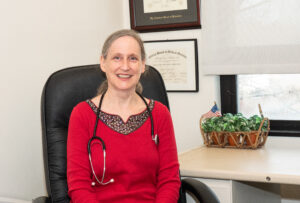The Pandemic Impacts All of Our Children
 The COVID pandemic continues to impact the children and families cared for at The Feingold Center for Children. The kids have adapted to wearing masks and seeing masks on the faces of those around them. Families are so grateful that their children have remained healthy or generally recovered well if infected.
The COVID pandemic continues to impact the children and families cared for at The Feingold Center for Children. The kids have adapted to wearing masks and seeing masks on the faces of those around them. Families are so grateful that their children have remained healthy or generally recovered well if infected.
The Challenges of Remote Clinical Visits
Our patients have unique needs that become harder to address during a pandemic. Often, their medical issues are too complex for remote visits. Many need in-person therapies or education to thrive, while others are too medically fragile for in-person learning. Schools and therapeutic centers across New England are struggling to maintain full staffing.
Helping Patients Get Insurance Authorization
Just this week, I heard from “Nancy,” who gave birth to “Tamara” during the pandemic. Tamara primarily has had remote care. Virtual medical visits missed Tamara’s important physical issues, and remote therapy for developmental delays was ineffective. Before another family referred Nancy to The Feingold Center for Children, Nancy struggled to navigate the healthcare system independently. Nancy did a tremendous job, and thankfully, Tamara is beginning to thrive. However, no one has yet looked for the cause of Tamara’s unique issues. I am testing Tamara for several rare disease possibilities with the help of The Feingold Center for Children’s care coordination team. Our team is also getting this family the insurance authorization needed for expensive genetic testing and helping me ensure that this little one sees all the right specialists. After hearing this mother’s tale, I worried about how many other “pandemic babies” are getting suboptimal, fractured care and are at risk of missing out on reaching their best potential.
Increase in Behavioral Issues Due To The Pandemic
In addition, the lack of everyday social interactions and the inability to gather with family and friends is taking a toll on our existing patients. Children, both those with rare medical and developmental disorders and those without, are struggling. The past 18 months of masks and social distancing have decreased the number of common cold and flu cases. We have even seen a reduction in injuries. But behavioral and mental health concerns are climbing. The past 6-9 months have increased the struggle with tantrums, depression, anxiety, and sadness for families. Kids are showing more aggression, regression, and moodiness. Annual visits with my patients used to focus on ensuring that complex medical needs were addressed. Now, I am spending additional time helping families determine if their child’s behavior is related to an underlying rare disorder or a reaction to the changes in the world around us. Often, parents need a sympathetic ear, some basic behavioral guidance, and reassurance that their child’s behaviors are typical. The support from The Genesis Foundation for Children makes all the difference in being able to provide families with extra time and attention.
Please continue your generous support of The Genesis Foundation for Children and brighten the future for these amazing children.
Next week, we’ll introduce you to the fantastic and rare mother-daughter duo Amy and Jordynn.

